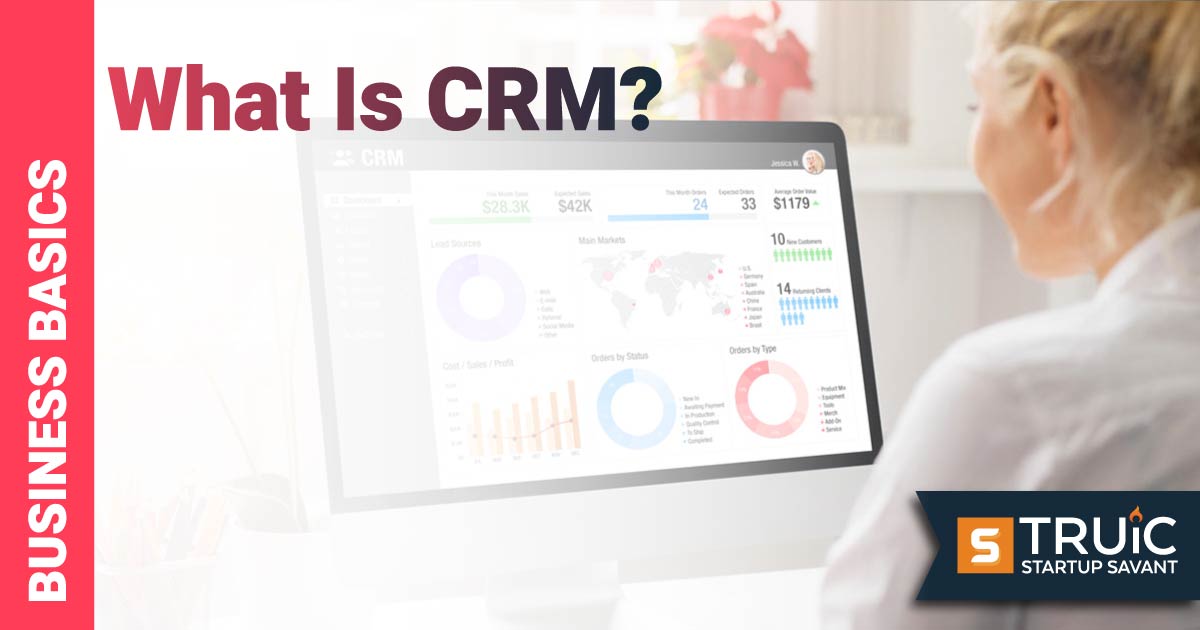Mailchimp CRM Review 2024
Is It the Best CRM Software?

Last Updated: By TRUiC Team
Because CRM software captures and leverages customer information that companies can use to drive marketing and sales efforts, many startups are discovering that having a solid CRM system helps them to scale their business more quickly and capably. But which is the best CRM software for your startup?
One CRM option that we strongly recommend for startups is Mailchimp. Read our Mailchimp CRM review below for a thorough overview of Mailchimp’s features and how it compares to the competition.
Recommended: Check out our review of the best CRM for startups.
Pros and Cons of Mailchimp CRM
Mailchimp started as an email marketing company, so it delivers when it comes to marketing tools and integrates easily with existing marketing plans. Today,it offers a full suite of features and add-on capabilities that your startup can use to organize and optimize all aspects of CRM. Of course, like all major players in the CRM software field, it has its strengths and weaknesses. Let’s take a closer look:
Pros of Mailchimp CRM Software
- Easy to use
- Strong integration capabilities
- Reporting, analytics, and tracking tools
Cons of Mailchimp CRM Software
- Paid plans needed to access more advanced features
- Live support is only available with paid plans
Mailchimp CRM Pricing and Features
Budget-minded, early-stage startups will be happy to know that Mailchimp has a free plan with some generous features included. After that, Mailchimp offers three tiered plans with pricing based on features included and user seats. With your paid plan, you can also increase your maximum contact count and monthly email allowance by paying an additional charge.
Free
Notable Features:
- 2,500 monthly email sends
- 500 contacts
- 300+ integrations
- Basic reporting and analytics
- Forms and landing pages
Essentials (Starts at $11/Month)
Notable Features:
- 5,000 monthly email sends
- 50,000 contacts
- 24/7 Email and live chat support
- A/B Testing
- Automated workflows
Standard (Starts at $17/Month)
Notable Features:
- 6,000 monthly email sends
- 100,000 contacts
- Enhanced workflow automation
- Custom templates
- Content Optimizer
Premium (Starts at $299/Month)
Notable Features:
- Unlimited contacts and users
- 150,000 monthly email sends
- Priority phone support
- Comparative reporting
- Dedicated onboarding specialist
Mailchimp CRM Reviews
Knowing the pricing and features offered can help you make an informed decision. But it won’t exactly give you a sense of what it is like to actually work with Mailchimp CRM software. For that, we’ve researched the feedback of actual users so that you can get a better sense of what other businesses are using Mailchimp for and how it might work for your startup.
Here are some verified reviews from TrustRadius by people who used Mailchimp CRM:
“Any marketer with a larger customer base will find Mailchimp a really useful tool. It's the best way to mass update your client base on what's happening at your business. Add in segmentation and then you can really nail down what you're sending out and make sure the relevant info gets to the relevant customer.”
“I act as a solopreneur and I always use Pipedrive as my CRM where all the leads are at. If you need a simple email marketing tool that integrates seamlessly with your CRM, and you're not SUPER avid with building email marketing templates, Mailchimp is a great option. If you're using it for RTL campaigns you might need a different system, depending on how far MailChimp has come since I've used them.”
“We used MailChimp as our CRM and email platform. We used it to maintain our list of active members, to communicate with them via newsletters, and advise on special events and event followup. It was also helpful in that it would auto-post to other social platforms whenever we sent a newsletter or one-off email announcing a special event.”
As you can see, it’s no surprise that Mailchimp received high marks from users for its email marketing capabilities. Email marketing is at the heart of what Mailchimp does. Many businesses have had positive experiences with Mailchimp’s ability to collect customer data, store it and track it, as well as its capabilities to launch and optimize email marketing campaigns.
Mailchimp’s CRM software, and in particular its paid plans, come equipped with stylish and, for the higher tiered plans, customizable templates that give your campaigns a personalized feel. Customers find that developing and sending newsletters in Mailchimp is a simple process.
Overall, startups and small businesses find Mailchimp to be easy-to-use and extremely versatile at capturing, managing, and taking follow-up actions with contacts. In addition, businesses with large customer bases appreciate Mailchimp’s ability to mass update across social media platforms. However, some larger enterprises, or smaller businesses with complex CRM needs, might find that its marketing emphasis means some advanced sales process features are lacking.
How Does Mailchimp CRM Compare?
There are plenty of competitors out there that offer CRM software for startups. One of the more popular is HubSpot. We find that Mailchimp compares to HubSpot in the following ways:
Pricing
Both HubSpot and Mailchimp offer free plans that would appeal to small businesses or initial-stage startups on a tight budget. Mailchimp’s plan allows you up to 2,500 emails a month, while HubSpot’s only allows for 2,000. After that, both offer three paid plans with pricing based on features, users, and maximum contacts. Mailchimp’s plans range from $11 to $299 monthly with a one-year subscription. The pricier plans from HubSpot start at $45/month and increase to $3,600/month for Enterprise users.
You’ll have access to over 300 integrations with Mailchimp’s Standard plan, but to reach that at HubSpot, you’ll have to sign up for the more expensive Professional plan. HubSpot doesn’t offer A/B Testing until you opt for its $800/month Professional account, whereas Mailchimp includes A/B Testing with its $11/month Essentials plan. Bottom line, Mailchimp offers loads of integration capabilities and features at affordable price points that would be appealing to any startup.
Features
Mailchimp and HubSpot are both feature-rich, so to see how they differ, it helps to consider both companies' origins. Mailchimp began its life as an email marketing platform with strong customer management tools, whereas HubSpot started as a way to help businesses manage sales, marketing, and customer systems. As you would expect, Mailchimp boasts highly popular features that help you grow your business through email marketing, while HubSpot offers more all-around process-oriented features.
For example, both platforms offer lead generation, tracking, and marketing automation. But when it comes to the sales side, Mailchimp does not allow you to create quotes or custom invoices — HubSpot does. Both provide social media tools that allow your campaigns to reach out across platforms. HubSpot also offers task management and document storage capabilities. When it comes to overall CRM-oriented features, HubSpot has more advanced capabilities built-in, but for a startup, Mailchimp’s growth-oriented offerings may be easier to use.
Ease of Use
Mailchimp and HubSpot both have a reputation for being easy to use. Both have interfaces with a contemporary, clean look. Buttons are prominently displayed, and navigation is simple with a few minor glitches, such as one or two Mailchimp links being buried too deeply in dropdown menus. However, both come with easy-to-use drag-and-drop editors and a simplified, intuitive feel that shouldn’t overwhelm new users.
For certain tasks, Mailchimp is faster, but HubSpot can offer more insights. When it comes to onboarding, Mailchimp’s free plan comes with 30 days of email support, whereas HubSpot’s free plan only includes community support. There are also some advanced workflow features in HubSpot that may feel confusing, especially for a smaller organization. Basically, when it comes to ease of use, both Mailchimp and HubSpot come out on top.
Integrations
Mailchimp integrates with a wide variety of popular applications, like QuickBooks and Shopify. Through Mailchimp Marketplace, you can add customer support tools like Live Chat or ZenDesk. Mailchimp gives you access to over 300 integrations with all of its plans. HubSpot, meanwhile, has invested in the growth of its app offerings, and it shows. You can currently find over 1,000 integrations and add-ons in HubSpot’s well-named App Ecosystem.
HubSpot has a reputation for offering more robust social media integration. Mailchimp, meanwhile, takes the lead for its email marketing integration capabilities. Both CRM software platforms offer enough integration choices to allow any fast-growing startup to better centralize and manage its processes.
Bottom line? The more affordable Mailchimp will have loads to offer a startup, but HubSpot might draw a more mature enterprise for its more niche, advanced offerings.
Customization
With HubSpot, you will have the ability to create custom objects and custom processes. This enables you to build a workflow process that reflects the unique approach of your business. Once a custom object is created, you can link it to a standard object, like a company, to better keep track of your deals and leads. However, custom object creation is only available with the pricey Enterprise level plan.
Mailchimp allows you to customize landing pages and forms. You’ll also have the ability to customize design, signatures, and other aspects of email marketing campaigns. Mailchimp also has a new Customer Journey Builder feature that allows you to create customized paths for customers with custom offers. While both Mailchimp and HubSpot offer customization capabilities, Mailchimp’s built-ins are more on the email marketing side, while HubSpot’s are more process-focused.
Reporting and Analytics
Both Mailchimp and HubSpot’s free plans come with basic reporting and analytics capabilities that become more sophisticated as you move up their tiered plans. For example, Mailchimp provides real-time statistics on your email marketing campaigns. Mailchimp also includes a “Click Map” that lets you see when and where your customers have clicked. Another feature is its detailed revenue reports that can help you track the sales effect of marketing efforts and see recommendations for optimizing content.
HubSpot’s software can generate detailed sales reports throughout your sales pipeline, allowing you to build multiple dashboards to keep track of analytics. HubSpot can generate detailed sales forecasting and funnel reports that give you a peek into how your process is performing at different life stages. Mailchimp will provide you with all the data you need to optimize marketing efforts, while HubSpot generates a more complete picture of your sales pipeline processes.
Customer Support
Mailchimp’s free plan offers email support for the first 30 days, with access to web-based community support after that. The older company, Mailchimp, has a good deal of online support available. For its paid plans, Mailchimp provides 24/7 email and live chat support. However, you will find customers online venting their frustrations over response delays. With Mailchimp, only its highest-level Enterprise customers have priority access to online and live phone support.
HubSpot's free plan only provides community-based support. All paid plans, however, come with access to email and in-app chat support. With HubSpot's Professional plan, users can also reach live phone support. Considering the lower price tag, it’s not surprising that Mailchimp's lower plans lean toward self-service options. So, if you are a business with high-touch support needs, you might be drawn to a pricier provider like HubSpot.
Mailchimp:
Pricing starts at: $0
In Business Since: 2001
Perfect For: Early-stage or growth-stage startups with stronger marketing needs.
HubSpot:
Pricing starts at: $0
In Business Since: 2006
Perfect For: Growth-stage or advanced-stage startups with stronger sales needs.
Final Thoughts on Mailchimp CRM
Mailchimp offers a feature-rich CRM platform at an impressively affordable price that would be attractive to any tightly budgeted startup. Long praised for its email marketing capabilities, Mailchimp is designed to help scale your business and comes with a straightforward interface that will allow you to organize all of your customer information in one place easily.
Its analytics and A/B Testing capabilities will allow you to make decisions that help your startup more effectively reach customers and drive growth. Large businesses may opt for a CRM with a richer sales orientation, but most startups will find everything they need, plus loads of integration and scaling capabilities in Mailchimp CRM software.
Frequently Asked Questions
What is Mailchimp?
Mailchimp is a comprehensive email marketing platform designed to help you scale your business, capture more customers, and more effectively manage the ones you have.
Can Mailchimp be used as a CRM? How?
Yes! Many startups and businesses are already using Mailchimp as their CRM tool. This is because Mailchimp comes with all of the tools required to capture, manage and optimize your customer data and interactions in one place.
What CRM is better than Mailchimp?
Mailchimp is a high-performing CRM with an impressively affordable price tag that includes reporting, comprehensive email marketing, and online sales features. However, if you are a larger organization with a more complex sales pipeline and advanced forecasting needs, you may decide Salesforce, with its rich offering of advanced enterprise capabilities, is the best CRM software for your business.


